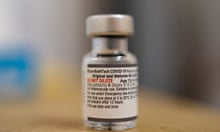Scientists have created a vaccine that has the potential to protect against a broad range of coronaviruses, including varieties that are not yet even known about.
The experimental shot, which has been tested in mice, marks a change in strategy towards “proactive vaccinology”, where vaccines are designed and readied for manufacture before a potentially pandemic virus emerges.
The vaccine is made by attaching harmless proteins from different coronaviruses to minuscule nanoparticles that are then injected to prime the body’s defences to fight the viruses should they ever invade.
Because the vaccine trains the immune system to target proteins that are shared across many different types of coronavirus, the protection it induces is extremely broad, making it effective against known and unknown viruses in the same family.
“We’ve shown that a relatively simple vaccine can still provide a scattershot response across a range of different viruses,” said Rory Hills, a graduate researcher at the University of Cambridge and first author of the report. “It takes us one step forward towards our goal of creating vaccines before a pandemic has even started.”
Tests in mice showed that the vaccine induced a broad immune response to coronaviruses, including Sars-Cov-1, the pathogen that caused the 2003 Sars outbreak, even though proteins from that virus were not added to the vaccine nanoparticles. Details of the work, a collaboration between the universities of Cambridge and Oxford and the California Institute of Technology, are published in Nature Nanotechnology.
The universal coronavirus vaccine can be made in existing facilities for microbial fermentation, Hills said, adding that the researchers were working with industrial partners on ways to scale up the process. The nanoparticles and viral proteins can be made at different times in different places and mixed together to produce the vaccine.
Medical regulators do not have procedures for proactive vaccinology and the researchers say these would have to be worked out with the relevant bodies. If the vaccine were found to be safe and effective in humans, one option would be to use it as a Covid booster with the added benefit of it protecting against other coronaviruses.
More likely is that countries would hold stocks of the vaccine, and others designed to target separate pathogens, once they have been manufactured and approved. “In the event that a coronavirus or other pathogen crosses over you could have pre-existing vaccine stocks ready and a clear plan to quickly scale up production if needed,” Hills said.
Prof Mark Howarth, a senior author of the study, said: “Scientists did a great job in quickly producing an extremely effective Covid vaccine during the last pandemic, but the world still had a massive crisis with a huge number of deaths. We need to work out how we can do even better than that in the future, and a powerful component of that is starting to build the vaccines in advance.”










